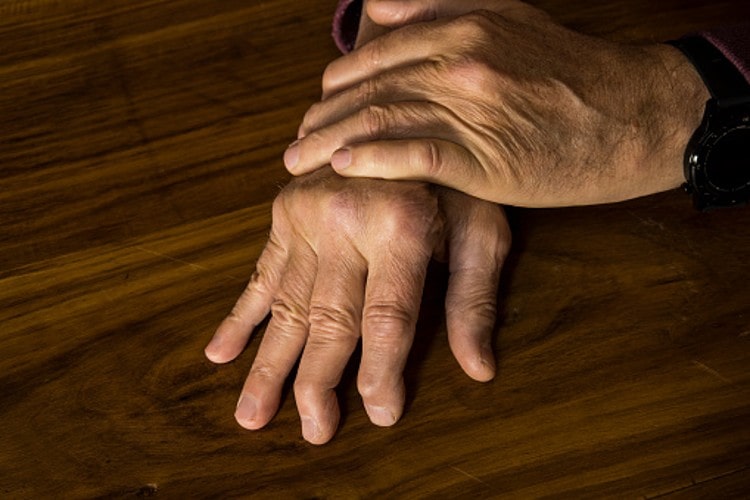Psoriatic Arthritis Treatment – Symptoms, medication, Foods, Ultimate Guide
If you are one of the millions of people affected by psoriatic arthritis, then you know how debilitating this condition can be. Symptoms such as joint pain, stiffness, and swelling can make everyday activities very difficult. In this blog post, we will discuss the best psoriatic arthritis treatment options available to you.

If you’re one of the millions of Americans suffering from psoriatic arthritis, you know just how debilitating and painful the condition can be.
But there’s hope! There is new psoriatic arthritis treatment is designed to stop progression of the disease, reduce inflammation, and relieve pain. Plus, it helps keep joints healthy and functioning properly. So don’t suffer any longer – give our treatment a try today!
We will also talk about the various medications that are used to treat psoriatic arthritis. Don’t suffer any longer! Read on for information about the latest treatments for psoriatic arthritis.
What is best Psoriatic Arthritis Treatment?
There is no one-size-fits-all answer to this question, as the best psoriatic arthritis treatments will vary depending on the severity of your condition. However, many people find that a combination of psoriatic medication and lifestyle changes is the most effective way to manage their psoriatic arthritis.
Medications used to treat psoriatic arthritis include nonsteroidal anti-inflammatory drugs (NSAIDs), disease-modifying antirheumatic drugs (DMARDs), biologic agents, and corticosteroids.
In some cases, joint replacement surgery may be necessary.
What is the first line treatment for psoriatic arthritis?
The first line treatment for psoriatic arthritis typically includes NSAIDs or DMARDs. These medications can help to reduce inflammation and pain, and slow the progression of the disease. Biologic agents may also be used in some cases.
Can psoriatic arthritis go away?
In many cases, psoriatic arthritis will not go away completely. However, with treatment using psoriatic medication, it is often possible to achieve remission, or a state in which symptoms are mild and infrequent.
What triggers psoriatic arthritis?
The exact cause of psoriatic arthritis is unknown. However, it is thought to be related to an overactive immune system. There are also several genetic and environmental factors that may play a role in its development.
What are the early warning signs of psoriatic arthritis?
Early warning psoriatic arthritis symptoms and signs include joint pain, stiffness, and swelling. These symptoms may come and go, or they may be constant. Other early signs include fatigue, fever, and weight loss.
What are the five types of psoriatic arthritis?
The five types of psoriatic arthritis include symmetric psoriatic arthritis, asymmetric psoriatic arthritis, distal interphalangeal predominant psoriatic arthritis, spondyloarthropathy psoriatic arthritis, and arthropathy psoriatic arthritis.
How serious is psoriatic arthritis?
Psoriatic arthritis is a chronic condition that can lead to joint damage and disability if left untreated. It is also associated with an increased risk of other health problems, such as psoriasis, heart disease, and inflammatory bowel disease.
Can you treat psoriatic arthritis without medication?
In some cases, psoriatic arthritis can be treated without medication. However, most people will require at least some form of medical treatment to manage their symptoms. Lifestyle changes, such as exercise and diet, can also help to reduce the severity of symptoms.
ALSO Read: The #5 Best CBD Gummies of 2022 for Pain, Inflammation, Anxiety, Stress and Better Sleep
What is the best injection for psoriatic arthritis?
The best injection for psoriatic arthritis depends on the individual’s specific situation. Steroid injections are often used to relieve pain and inflammation. Other injectable medications that may be used include biologic agents and DMARDs.
The focus of this psoriatic arthritis treatments is on halting the progression of the disease, reducing inflammation, treating skin symptoms and relieving pain.
This treatment work to keep your joints healthy and functional, while also addressing the underlying cause of the condition. The treatment approach is tailored to each individual, based on the severity of their symptoms and the stage of their disease.
This aim to provide you with the best possible care, so you can lead a full and active life.
How is psoriatic arthritis diagnosed?
Psoriatic arthritis is typically diagnosed by a rheumatologist, a doctor who specializes in the diagnosis and treatment of arthritis and other inflammatory conditions. A physical examination, medical history, blood tests, and imaging tests may be used to confirm the diagnosis. If you start feeling symptoms of psoriatic then it’s the best time to get diagnosed of this disease.
What are the long-term effects of psoriatic arthritis?
If left untreated, psoriatic arthritis can lead to joint damage and disability. It is also associated with an increased risk of other health problems, such as psoriasis, heart disease, and inflammatory bowel disease. Early diagnosis and treatment are essential to prevent these serious complications.
Can psoriatic arthritis be cured?
There is no cure for psoriatic arthritis. However, with treatment, it is often possible to achieve remission, or a state in which symptoms are mild and infrequent. Early diagnosis and treatment are essential to prevent joint damage and disability.
What is the most effective psoriatic arthritis medication?
The most effective psoriatic arthritis medication depends on the individual’s specific situation. NSAIDs, DMARDs, biologic agents, and corticosteroids are often used to relieve pain and inflammation. In some cases, joint replacement surgery may be necessary.
If you have psoriatic arthritis, it’s important to work with your doctor to create a treatment plan that works for you. There are many different options available, so don’t hesitate to ask questions or seek second opinions if needed. With the right treatment, you can manage your symptoms and enjoy a good quality of life.
Can you treat psoriatic arthritis without medication?
In some cases, psoriatic arthritis can be treated without medication. However, most people will require at least some form of medical treatment to manage their symptoms. Lifestyle changes, such as exercise and diet, can also help to reduce the severity of symptoms.
What is the best injection for psoriatic arthritis?
The best injection for psoriatic arthritis depends on the individual’s specific situation. Steroid injections are often used to relieve pain and inflammation. Other injectable medications that may be used include biologic agents and DMARDs.
What is the most effective psoriatic arthritis medication?
The most effective psoriatic arthritis medication depends on the individual’s specific situation. NSAIDs, DMARDs, biologic agents, and corticosteroids are often used to relieve pain and inflammation. In some cases, joint replacement surgery may be necessary.
If you have psoriatic arthritis or feeling psoriatic arthritis symptoms and signs, it’s important to work with your doctor to create a treatment plan that works for you. There are many different options available, so don’t hesitate to ask questions or seek second opinions if needed. With the right treatment, you can manage your symptoms and enjoy a good quality of life.
Should mild psoriatic arthritis be treated?
Mild psoriatic arthritis can often be treated with lifestyle changes and over-the-counter medication. However, more severe cases may require prescription medication or surgery. It is important to work with a doctor to develop a treatment plan that is right for you.
Is prednisone used for psoriatic arthritis?
Prednisone is a type of steroid that can be used to treat psoriatic arthritis. It works by reducing inflammation. Prednisone may be taken as a pill or injected into the joint. Side effects of prednisone include weight gain, mood changes and trouble sleeping.
What are the side effects of methotrexate for psoriatic arthritis?
Methotrexate is another medication used to treat psoriatic arthritis. It can help reduce pain, swelling and stiffness in the joints. Methotrexate can also help prevent damage to the joints. Side effects of methotrexate include nausea, vomiting and diarrhea.
Steroid injections are also a common treatment for psoriatic arthritis. Steroids are a type of anti-inflammatory medication that can be injected into the joints to reduce pain and swelling. Side effects of steroid injections include joint pain, stiffness and bruising.
Joint replacement surgery is an option for people with psoriatic arthritis who have severe joint damage. In this surgery, the damaged joint is removed and replaced with an artificial joint. Joint replacement surgery can help improve quality of life for people with psoriatic arthritis.
Psoriatic arthritis is a chronic condition, which means it can last for years or even a lifetime. There is no cure for psoriatic arthritis, but there are treatments that can help reduce symptoms and prevent further joint damage.
What are the six signs of psoriatic arthritis?
The six signs of psoriatic arthritis are joint pain, stiffness, swelling, morning stiffness, skin psoriasis and nail changes. Joint pain is the most common symptom of psoriatic arthritis. It can be mild or severe and may come and go.
Joint stiffness is another common symptom. It may be worse in the morning or after sitting for a long period of time. Swelling occurs when the joints are inflamed symptoms of psoriatic arthritis flare. Morning stiffness is often a sign of psoriatic arthritis.
Skin psoriasis is a condition that causes red, scaly patches on the skin. Nail changes include thickening, crumbling or pitting of the nails. If you have any of these symptoms, see your doctor for a diagnosis.
Psoriatic arthritis is a type of inflammatory arthritis that can cause joint pain, stiffness, swelling and morning stiffness. Many people with the condition are also affected by skin psoriasis. There is no cure for psoriatic arthritis, but there are treatments that can help reduce symptoms and prevent further joint damage.
Psoriatic Arthritis Treatment
What are some home remedies for psoriatic arthritis?
There are several home remedies that may help relieve symptoms of psoriatic arthritis. These include:
• Taking over-the-counter pain medications such as ibuprofen or acetaminophen
• Applying heat or cold to the joints
• Exercising regularly
• Taking breaks during periods of increased pain or swelling
• Practicing stress-relieving techniques such as yoga or meditation
If you have psoriatic arthritis, talk to your doctor about which home remedies may be best for you. They can help you create a treatment plan that will relieve your symptoms and improve your quality of life.
Psoriatic arthritis is a type of inflammatory arthritis that can cause joint pain, stiffness, swelling, and morning stiffness. Many people with the condition are also affected by skin psoriasis. There is no cure for psoriatic arthritis, but there are treatments that can help reduce symptoms and prevent further joint damage.
One of the most important things you can do if you have psoriatic arthritis is to stick to your treatment plan.
If you have psoriatic arthritis, it’s important to stick to your treatment plan there is no psoriatic arthritis cure soon. This may include taking medication to reduce inflammation, receiving steroid injections, and/or undergoing joint replacement surgery. It’s also important to exercise regularly and take breaks during periods of increased pain or swelling.
Practicing stress-relieving techniques such as yoga or meditation can also help.
psoriatic arthritis is a chronic condition that has no cure. However, there are psoriatic arthritis symptoms available that can help to reduce symptoms and prevent further joint damage. If you have psoriatic arthritis, it’s important to stick to your treatment plan.
This may include taking medication to reduce inflammation, receiving steroid injections, and/or undergoing joint replacement surgery. In addition, regular exercise, taking breaks during periods of increased pain or swelling, and practicing stress-relieving techniques can all help.
You may talk to your doctor about treatment options for you. They can help you create a personalized treatment plan that will relieve your symptoms and improve your quality of life.
What is the long-term outlook for people with psoriatic arthritis?
The long-term outlook for people with psoriatic arthritis is generally good. Most people are able to control their symptoms with medication and lifestyle changes. However, some people may experience periods of flares (when symptoms worsen) and remission (when symptoms improve).
Joint damage can also occur in some people with psoriatic arthritis. If joint damage is severe, joint replacement surgery may be necessary.
What foods to avoid if you have psoriatic arthritis?
There is no specific psoriatic arthritis diet that people with psoriatic arthritis should follow. However, some people find that certain foods can trigger or worsen their symptoms. If you have psoriatic arthritis, you may want to avoid or limit your intake of the following foods:
• Nightshade vegetables (such as tomatoes, potatoes, and peppers)
• Alcohol
• Sugar
• Dairy products
• Gluten-containing foods (such as wheat, barley, and rye)
Talk to your doctor about whether you should make any changes to your diet. They can help you identify which foods may be triggering your symptoms and advise you on how to best manage your condition.
If you have psoriatic arthritis, there are several treatment options available that can help to reduce your symptoms. These include medication, exercise, and dietary changes.
With proper treatment, most people with psoriatic arthritis are able to live normal, healthy lives.
What is psoriatic arthritis?
Psoriatic arthritis is a type of inflammatory arthritis that affects around 30 percent of people who have psoriasis. Symptoms include stiffness, joint pain, and swelling, which may flare and subside. The majority of people with psoriatic arthritis are affected by morning stiffness. Also know that mild skin psoriasis will have a significant level of arthritis.
There is no cure for psoriatic arthritis, but there are treatments available that can help to reduce symptoms and prevent further joint damage. If you have psoriatic arthritis, it’s important to stick to your treatment plan.
This may include taking medication to reduce inflammation, receiving steroid injections, and/or undergoing joint replacement surgery. In addition, regular exercise, taking breaks during periods of increased pain or swelling, and practicing stress-relieving techniques can all help.
Your doctor may advice you on the best treatment options for you. They can help you create a personalized treatment plan that will relieve your symptoms and improve your quality of life.
Is walking good for psoriatic arthritis?
Yes, walking is good for psoriatic arthritis. Walking is a low-impact form of exercise that can help to reduce joint pain and stiffness. It also helps to improve your overall fitness and sense of well-being.
If you have psoriatic arthritis, aim to walk for at least 30 minutes on most days of the week. You may want to start with shorter walks and gradually build up to longer ones as your symptoms allow. Discuss with your doctor before starting any new exercise program. They can advise you on the best exercises for your condition and how often you should do them.
ALSO Read: The #5 Best CBD Gummies of 2022 for Pain, Inflammation, Anxiety, Stress and Better Sleep
What are the side effects of psoriatic arthritis medication?
The side effects of psoriatic arthritis medication depend on the type of medication you are taking. Common side effects of nonsteroidal anti-inflammatory drugs (NSAIDs) include stomach pain, diarrhea, and headache. Corticosteroids can cause weight gain, mood changes, and thinning of the skin.
Disease-modifying antirheumatic drugs (DMARDs) can cause hair loss, nausea, and fatigue. Biologic agents may increase your risk of developing infections. Talk to your doctor about the possible side effects of your medication. They can help you manage any side effects you may experience.
Is psoriatic arthritis worse than rheumatoid arthritis?
There is no right or wrong answer to this question. Each person experiences psoriatic arthritis differently. Some people find that their symptoms are mild and manageable, while others may find that their symptoms are more severe.
If you have psoriatic arthritis, it’s important to work with your doctor to create a treatment plan that alleviates your symptoms and improves your quality of life.
What can I do if my psoriatic arthritis is severe?
If you have severe psoriatic arthritis, there are several treatment options available that can help to reduce your symptoms. These include medication, exercise, and dietary changes. Reach out to your doctor about psoriatic arthritis symptoms options for you and what you can expect in the long term.
With proper treatment, most people with psoriatic arthritis are able to live normal, healthy lives.
While there is no cure for psoriatic arthritis, the right treatment can help you manage your symptoms and improve your quality of life.
If you have psoriatic arthritis, Discuss with your doctor top treatment options for you. They can help you create a personalized treatment plan that will relieve your symptoms and improve your quality of life.
Walking is a low-impact form of exercise that can help to reduce joint pain and stiffness. It also helps to improve your overall fitness and sense of well-being. If you have psoriatic arthritis, aim to walk for at least 30 minutes on most days of the week.
You may want to start with shorter walks and gradually build up to longer ones as your symptoms allow. Talk to your doctor before starting any new exercise program. They can advise you on the best exercises for your condition and how often you should do them.
What does psoriatic arthritis pain feel like?
psoriatic arthritis pain can vary depending on the person. Some people experience mild pain and stiffness, while others may have severe joint pain and inflammation. If you have psoriatic arthritis, it’s important to work with your doctor to create a treatment plan that alleviates your symptoms and improves your quality of life.
Psoriatic arthritis is a type of inflammatory arthritis. Symptoms include stiffness, joint pain, and swelling, this may flare as well as subside. Many people with the condition are affected by morning stiffness.
Best Psoriatic Arthritis Treatment biologics and Medication Psoriatic arthritis is a type of inflammatory arthritis. Symptoms include joint pain, stiffness, and swelling, which may flare and subside. Many people with the condition are affected by morning stiffness. Even mild skin psoriasis may have some level of arthritis.
Psoriatic arthritis treatments includes medication to reduce inflammation, steroid injections, and joint replacement surgery.
It is also associated with an increased risk of other health problems, such as psoriasis, heart disease, and inflammatory bowel disease.
ALSO Read: The #5 Best CBD Gummies of 2022 for Pain, Inflammation, Anxiety, Stress and Better Sleep






